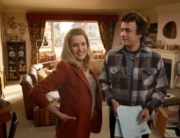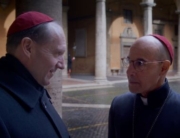
Words on Bathroom Walls shares a few traits with Donnie Darko and Little Miss Sunshine. Each movie involves a troubled young man who is a source of worry for his parents, and both Donnie Darko and Bathroom Walls involve an effects-laden voice that is audible only to the protagonist. In the former, this voice comes from a human-sized rabbit that only Donnie sees. In the latter, the voice is a result of a teen’s schizophrenia. This is where the similarities end.
This voice is the nastiest of several talking to Adam (Charlie Plummer), and it is the only one without a human representative. He can see Rebecca (AnnaSophia Robb), an encouraging hippie who is happy to tell him about his astrological signs; Joaquin (Devon Bostick), scantily dressed and horny; and a tough bodyguard (Lobo Sebastian), who carries a baseball bat and smokes a cigar. Though their presence plagues Adam, they are mostly on his side, encouraging him to pursue Maya (Taylor Russell) and his dream (becoming a chef).
The first voice, however, is usually accompanied by visual effects (creeping black smoke, fire, the unsteadiness of the world around him), and tells him there is no hope his life will ever change. As soon as his disorder emerges, Adam can no longer focus, he cannot relax around his peers, he has trouble cooking, and he is forced to leave his school. He goes through several unsuccessful rounds of medication, switches to a Catholic school, and finally learns to accept himself.
We will need to let the experts decide whether director Thor Fredenthal’s depiction of schizophrenia makes the cut. The film is built around the message that if you accept love into your life, all your problems will disappear, and I am willing to guess that treating schizophrenia is much more complicated. Realistic or not, Adam’s schizophrenic episodes are not compelling to watch. His relationship to these imagined companions is barely developed. They arrive briefly, say a few words, and disappear. They are also portrayed in such broad, hackneyed strokes that it is difficult to take them seriously. The script also relies too heavily on a voice-over narration that tells us everything and leaves nothing open to mystery.
Midway through, Adam meets Father Patrick (Andy Garcia) at confession. Father Patrick is tired, a little droll, gruff but full of compassion, and willing to go off the standard priest script to talk more casually. He is easily the most refreshing part of the film. It doesn’t save Words on Bathroom Walls, but in a movie like this, you take what you can get.






No one ever said that all his problems would disappear if he accepts himself. If you listened closely, he says at the end that love and self-acceptance will not cure anything, but it helps. There is nothing in the film that suggests that treating schizophrenia is not complicated. Adam speaking is not a “voiceover” but a depiction of a therapy session which does not “tell us everything”. This is not a murder mystery and nothing is given away except that we get a better insight into Adam’s thoughts. As far as developing his companions, since they are not real people but hallucinations, there is nothing to be gained to “develop” these characters. I thought this was a sensitive and deeply moving film that avoided typical histrionics and allowed you to relate to and care about the characters.